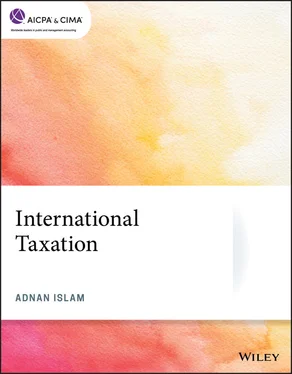Investment or passive types of income from U.S. sources (for example, fixed, determinable, annual, or periodical [FDAP]) — Sections 871 and 881
Effectively connected income (ECI) derived from a U.S. trade or business (ECI from a U.S. trade or business) — based on IRC, U.S. case law, and IRS rulings
Business profits attributable to a U.S. permanent establishment (PE) — based on U.S. tax treaties and conventions
Interest expense limitation or the thin capitalization and anti-earnings stripping rules, Section 163(j)
Debt versus equity U.S. tax law
Foreign Investment in Real Property Tax Act (FIRPTA) — the disposition of a U.S. real property interest by a foreign person (the transferor) is subject to U.S. source withholding tax. FIRPTA authorized the United States to tax foreign persons on dispositions of U.S. real property interests. Sections 897 and 1445. PATH Act revisions
Base erosion and anti-abuse tax (BEAT) — Section 59A
Modified Section 1446(f) and new Section 864(c)(8) reverses the holding within the Grecian Magnesite Mining case, and reverts to the original holding in Rev. Rul. 91-32 for U.S. income tax treatment of foreign partners who sell their interest in an operating U.S. partnership (that is, a U.S. partnership that has ECI from engaging in a U.S. trade or business)
Other fundamental U.S. international tax concepts
Choice of entity classification, U.S. “check-the-box” rulesSection 7701, and Treasury Regulation 301.7701-1, -2U.S. tax law governs the classification of a form of foreign business organization for U.S. tax purposes. The check-the-box regulations under Section 7701, generally effective January 1, 1997, provide that any “business entity” that is not required to be treated as a corporation is an “eligible entity” that may choose its classification. The regulations provide default classification rules. Eligible entities may elect out of the default rules. Entities that wish to change their previous classification must also do so by filing an election that qualifies for purposes of Section 7701.Form 8832 is known as the “check-the-box” election form, or the entity classification election form.
Sourcing of income and (allocation of) expenses
Tax treaties and conventionsTax treaties generally reduce withholding tax rates between Treaty partner jurisdictions and contain provisions that allow for procedures to avoid double taxation on one item of income by the same taxpayer by two different taxing jurisdictions and or States.
Transfer pricing rules — intercompany or related party transactions, Section 482Requires an arm’s length price or rate on an intercompany or related party transaction under Section 482, Treasury Regulations under Section 482, and Organization for Economic Co-operation and Development (OECD) rules.OECD’s base erosion and profit shifting initiativeCountry by Country (CbC) reporting
U.S. statutory withholding tax rules for FDAP income under chapter 3(regular) and chapter 4(FATCA for financial services industry) of the IRC
International tax fundamental concepts
Definition of “U.S. person”
The term “United States person” means
a citizen or resident of the United States;
a partnership created or organized in the United States or under the law of the United States or of any State, or the District of Columbia;
a corporation created or organized in the United States or under the law of the United States or of any State, or the District of Columbia;
any estate or trust other than a foreign estate or foreign trust. (See IRC Section 7701(a)(31) for the definition of a foreign estate and a foreign trust); or
any other person that is not a foreign person.
A foreign person includes a nonresident alien individual (NRA), foreign corporation, foreign partnership, foreign trust, a foreign estate, and any other person that is not a U.S. person. It also includes a foreign branch of a U.S. financial institution if the foreign branch is a qualified intermediary. Generally, the U.S. branch of a foreign corporation or partnership is treated as a foreign person. A nonresident alien is an individual who is not a U.S. citizen or a resident alien. A resident of a foreign country under the residence article of an income tax treaty is an NRA for purposes of U.S. withholding tax.
U.S. citizens, resident aliens, corporations, and fiduciaries are generally taxed on their export income in the same manner as on their domestic income from the United States.
U.S. businesses report income and deductions from export activities on the same tax returns used to report income from domestic sales. However, there are two significant differences:
1 Income may be considered earned by a U.S. business for purposes of U.S. taxation even though exchange or capital controls imposed by foreign governments restrict the ability of the business to use the proceeds of the export sale.
2 There are particular forms and schedules to be completed that reflect specific issues that arise only in international transactions.
 Example 1-1
Example 1-1
Sessions Corporation, a financial services company, incorporated and headquartered in the United States, opens a trading office in Sao Paulo, Brazil. Sessions office in Sao Paulo attracts investment from several large Brazilian investors. Sessions collects commissions for these sales but is not allowed to return its commissions to the United States due to a currency control recently imposed by the Central Bank of Brazil. Sessions must nevertheless report the Brazilian commissions on its U.S. federal income tax return, absent an election to file a separate U.S. Form 1120 for blocked income.
1 When a U.S. business has commission sales in country X but cannot remit the sales commissions to the United States due to currency control regulations in X, the U.S. business must recognize incomeWhen the sales commissions are remitted to the United States.On its U.S. federal income tax return.In an amount equal to 50% of the sales commissions.In an amount equal to 75% of the sales commissions.
In general, businesses are considered to recognize income and are required to report the income for tax purposes when the business receives the income, accrues the income under generally accepted accounting principles, or has the right to obtain the income.
Generally, income is recognized when received or accrued. Recognition of income may take place earlier than actual receipt; however, when funds are deposited in a bank account in the name of the business or otherwise made freely available to the business. Similarly, recognition of income may take place later than actual receipt if the funds are subject to future contingencies.
A business may recognize income even though payment is made to another company. The determination of whether the recipient is acting solely for the business depends on whether the recipient is a real entity engaged in a real transaction.
 Example 1-2
Example 1-2
Assume in example 1-1, that Sessions Corporation incurs a significant net operating loss in its Sao Paulo office and earns a substantial commission rendering services in the United States. Before collecting the commission, Sessions transfers the commission contract to its Brazilian subsidiary to shelter the commission income earned in the United States with the Brazilian loss. Upon examination of Sessions’ U.S. tax return, the IRS will include the U.S. commission in Sessions’ U.S. tax return.
Читать дальше

 Example 1-1
Example 1-1










